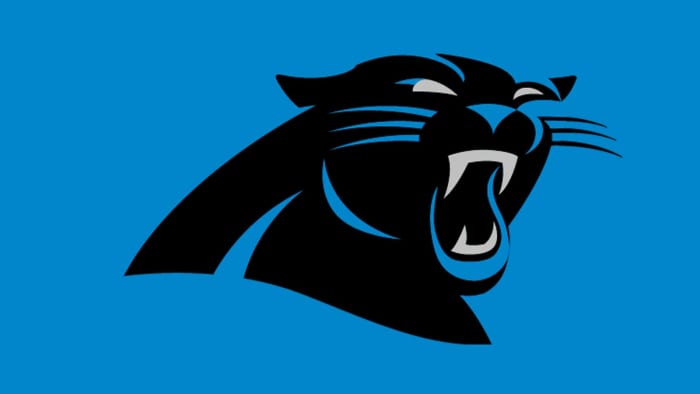Mark Carrier finished his 12-year NFL playing career with the Panthers in 1998. He now serves as the team's Player Engagement Director, and recently sat down to talk about his current role as well as his four years as a prolific wide receiver with the club.
How long have you been in your current role at Player Engagement Director for the Panthers?
"I've been back here now since 2011. My title has changed. At first I was called the Player Development Director. Basically, my main jobs are to help rookies transition into the league, educate them on programs that are available to them. During the offseason, I spend a lot of time with them, trying to go through every aspect that they will face – the challenges they will face, whether it's family members who will come to you and ask you for money or budgeting your money or what the expectations of the coaches will be, the expectations of the city and the team. Basically anything I can possibly think of that will help them make a successful transition from college to the NFL. That's what I focus on. I also try to get the guys interested in going back to school to get their degree if they don't already have it.
"But probably the most important thing that I focus on is to develop a relationship with all the players, and make sure they know that before they make a decision that can affect their career, they're comfortable enough to reach out to me and say, 'Mark, I'm struggling with this. Can you help me? Can you talk me through some stuff?' "
Do most of them realize you were a pretty good player yourself?
"Just based on the fact that I played helps a lot. I've gone through a lot of the things that they're going through. I've seen a lot of things happen that they will face. So there's nothing that really will surprise me and that helps me prepare them."
Are the players usually receptive to all your advice?
"You know what? The hardest thing is when you come into a new team and it's your first season. The role I have to fill involves building a lot of trust. But with the rookies, it's not a problem because I'm there when they first walk in the door on Day 1. It also helps that the guys know I'm here to help. I'm not here to do anything else but help."
You had to move back to Charlotte from Tampa when you joined the Panthers' front office in 2011, right?
"I had moved back to Tampa. That had been home to me since I got drafted by the Bucs. Even when I played here and in Cleveland, I kept my offseason home in Tampa. I was in Tampa and was doing a little ESPN radio and some personal training with players, trying to help them develop.
"I got a call from (then-general manager) Marty (Hurney) at the time. He told me about this job and told me it was mine if I wanted it. I debated about it a little bit, talked to my wife – because we had established some roots in Tampa. But it came down to me saying, 'If I got the chance to come back and work for a franchise, this would be the one I would want to come back to – because it's such a great franchise."

Let's talk about your playing days here … 1995 had to be a year like no other in your career when you had 66 catches for 1,002 yards, the only time a wide receiver has compiled over 1,000 receiving yards in the first year of an expansion franchise. What was it like from your perspective?
"I think there are probably a handful of things that stand out about that first season. Number one, Rock Hill, S.C., because that's where we practiced; and Clemson, because that's where we played our home games and we had to take a bus to those games.
"The other thing I remember is they had billboards all over the city promoting different positions on the team – and the receivers were not one of them. That was our motivation. Willie Green, Don Beebe and all those guys, we used that as motivation. That was a chip on our shoulder. Those are the things I think about."
What about that first team as a whole?
"I look at that entire group as being a bunch of players that a lot of teams didn't want anymore. Either they were older players or their contracts were too high. I know from my situation in Cleveland that they didn't protect me in the expansion draft because they thought my salary was so high that (the Panthers) wouldn't take me. But Richard Williamson (then the Panthers' receivers coach) had been the receivers' coach in Tampa when they drafted me, so he was instrumental in getting me here.
"So you had a bunch of older players who either wanted to end their careers on a high note, or had chips on their shoulders because they thought another team had given up on them. That made for some great veteran leadership for the younger guys we had, and we just gelled as a group."
What were those bus trips to Clemson like?
"We watched movies. A lot of guys just had their headphones on. I rebelled the first time and drove myself because I said, 'I'm not going to ride a bus.' But I never did that again, because traffic was bad and you save the gas, save the money. But it was pretty brutal."
What was it like winning the NFC West division in 1996 and going all the way to the NFC championship game?
"It was an unbelievable year for us. I made this comment two years ago and guys didn't want to believe me, but that '96 team, in my opinion, was the best team that ever played for the Panthers. And I say that even knowing about the team that later went to the Super Bowl (in 2003).
"And I say that because you had a group of veteran guys who really put their heart and soul into the game. They played as hard as they possibly could, and they played with a purpose. I don't ever remember playing on a team that was so focused on playing so well. Other than a bad first half in Green Bay (in the NFC championship game), we probably would have won not only that game, but we should have gone on to win the Super Bowl."















